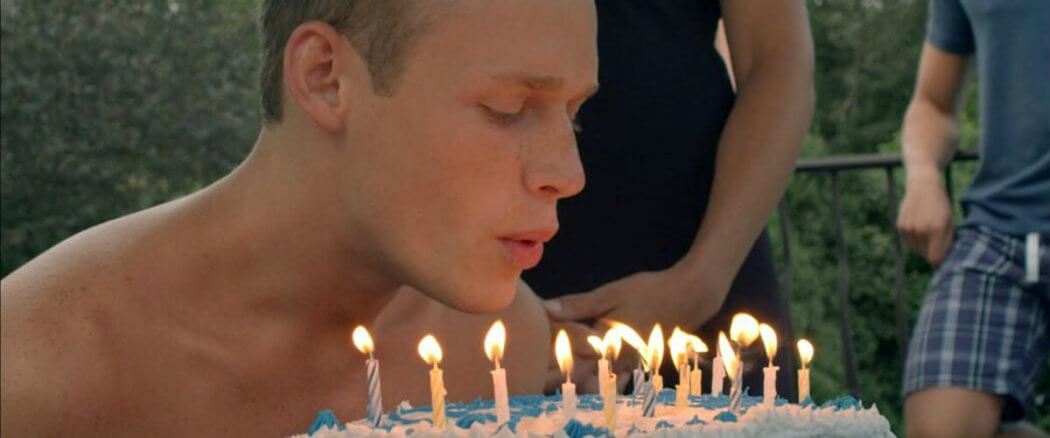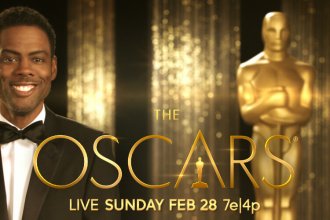For all of you who haven’t been wanting to watch this movie for over a year, allow me let you into my world. My anticipation for Henry Gamble’s Birthday Party started after seeing The Wise Kids which is a a similar but more idyllic movie by the same director, Stephen Cone. The Wise Kids was the first film I ever saw that followed church people navigating issues of sexuality and doubt in such a way that didn’t leave every situation neat and resolved (like, real life). The director, Cone, is able to do this not only because he is the son of a Southern Baptist minister but, as one of the cast members said, because “He grew up loving these people.” This complex, realistic feel with the under-girding of Cone’s value of the people portrayed is actually what earned this movie the final spot in Milwaukee’s LGBT film festival. Needless to say, my friends and I who saw it were pretty impressed and I hope that after this review you will be too.
“There’s the Birthday Boy!”
The film opens with Henry and his friend Gabe, who are obviously close, in bed talking about girls, and Henry’s upcoming party. The talk turns pretty intimate concerning a particular girl who they expect to be at the party. As they’re talking it becomes clear that while Gabe is infatuated with Emily, Henry is attracted to Gabe. Nothing is said but you get the idea quickly. In the next scene, Kat, Henry’s mother (who could write a memoir with just her facial expressions), crawls out of bed as if she’s been fighting a battle all night. Nothing is said but so much is communicated.
As guests arrive it’s clear that there’s a lot of background informing their welcome. There’s Jon who is cheered and called into the pool while Logan, another gay youth, receives a more chilled welcome. Rose, a church friend and recent widow, gets hugs and greetings from everyone, confessing with only a little embarrassment that she brought wine. She is neatly contrasted with her son, Ricky, who recently attempted suicide and seems to set everyone on edge simply by existing. One by one characters arrive with their secrets, their enthusiasm, and their gifts for Henry in tow.
“Are You Churched?”
The pool party has some obvious divisions. Even as people describe the party they call out the party-goers by categories: school friends, megachurch friends, and church people. These disparate groups try to mingle at first but a couple of conversations reveal the the sharp boundaries separating them.
 After everyone has arrived we join a conversation between Jon, a church kid, and a school friend Christine. Jon is running Christine and her friend through a series of worldview questions which culminates in “Well, do you believe in anything?” to which Christine fumbles out something like “Uh, yeah, I believe in love and beauty and freedom.” Strangely she’s not prepared to talk about this with a stranger at a pool party. “Do you believe in God?” Jon counters. “No, I don’t,” she admits. At this point the conversation ends with an invitation to their church’s youth group. As Jon swims away, the girls turn to Henry with a giggle and ask if he thinks they’re “going to burn.”
After everyone has arrived we join a conversation between Jon, a church kid, and a school friend Christine. Jon is running Christine and her friend through a series of worldview questions which culminates in “Well, do you believe in anything?” to which Christine fumbles out something like “Uh, yeah, I believe in love and beauty and freedom.” Strangely she’s not prepared to talk about this with a stranger at a pool party. “Do you believe in God?” Jon counters. “No, I don’t,” she admits. At this point the conversation ends with an invitation to their church’s youth group. As Jon swims away, the girls turn to Henry with a giggle and ask if he thinks they’re “going to burn.”
This conversation is especially adept at highlighting a sharp division running through the youth. There are church kids, not necessarily characterized by their imitation of Christ but rather their adoption of Christian culture, and school friends. Cone’s portrayal of the church culture is particularly hard to watch having grown up steeped in it.
What appears to be a difference in religion, I believe, is actually a clash of cultures. The party-goers aren’t quibbling over the meaning of Jesus’ teachings or whether he was merely a prophet or if he lived at all. Their discussions are over evolution, purity culture, the acceptance of gay people, and the like which not only divide them but identify them as “the other” in this culture war. These kids are unable to interact as equals but live almost entirely on the level of us and them, the holy and the pagan.
“Tell Me It’s OK”
Some situations in Henry Gamble are easy to understand and analyze (like the section above) but there are others that operate at a deeper level that are important but more mysterious. There are at least four major character relationships that are more hostile than you’d expect, especially at a pool party where only select people are invited. I know that there could be many reasons for this, but we’re not directly supplied with reasons for some of them, so I’m going to go out on a limb and say it’s shame.
 Because there is such a polarization between the us-them, holy-pagan, elect-dammed playing out here I believe when someone in the former categories does or is something exceptionally inappropriate they develop a center of shame (a feeling that I am wrong, instead of I did wrong). I’ve experienced this in a similar context and I think it results not only from having an elevated picture of ‘our group’ but no clear way to receive absolution. And while Cone’s characters don’t ask for forgiveness, we hear the line “tell me it’s OK” several times, with other phrases like “he needs your blessing” conveying the same point.
Because there is such a polarization between the us-them, holy-pagan, elect-dammed playing out here I believe when someone in the former categories does or is something exceptionally inappropriate they develop a center of shame (a feeling that I am wrong, instead of I did wrong). I’ve experienced this in a similar context and I think it results not only from having an elevated picture of ‘our group’ but no clear way to receive absolution. And while Cone’s characters don’t ask for forgiveness, we hear the line “tell me it’s OK” several times, with other phrases like “he needs your blessing” conveying the same point.
For example, Henry is gay and in denial about it (even to his closest friends). Logan is also gay and attracted to Henry. Not only is Henry definitely not welcomed to the party, but if you watch the trailer you’ll see a scene where Logan brushes up against Henry, to which Henry tells him firmly to stop and walks away. We’re never told why Henry is so averse to Logan but I think it’s because of this shame complex. Henry so avoids confronting his own sexuality that he scapegoats his angst onto Logan and can’t see him as just Logan – Logan is his own sexuality confronting him. This is conjecture, however; as the movie plays out and Henry is more able to confront himself, we see this relationship take some halting steps forward ending in a plea for a sort of absolution. If it is a theme, it’s happening in other major relationships and regardless is a major problem for conservative Christianity.
“We’re Doing This All Wrong!”
By the end of the movie we’re past the quick smiles and well-wishes that characterized the party’s beginning. We’ve watched the sanctified sideways condemnation, cheered for those who want to escape to find some freedom, seen gay people wish to be straight, ill wish to be well, excluded longing to be included, all of which reveal the inability of this church community to be healthy. This church has had many of these people’s entire lives to teach them what life in Christ looks like, and yet here we have a youth attempting suicide with no one to lead him to life, a child continually bullied for his sexuality while also the subject of church gossip, a woman who had an affair craving absolution, and these are just a few of the many characters around the pool.
During the film one of these characters so described has a complete breakdown and in the chaos that ensues another character, Larry, yells out, “We’re doing this all wrong!” Although this character could have been brought low by a variety of forces Larry seems to believe the trigger was how the church community handled (or mishandled) this person’s sexuality. Though it’s not stated, I believe Cone is inviting us to see the general epidemic of our conservative church’s problem with gay people through this story. You could say the church has mastered incompetence in the area of sexuality, and not in a benignly silly way but in such a manner as to thrust people out of the church and more than occasionally into the grave.
At the end of the movie Cone left me with one dominating question: What will it take? What will it take for God’s people to see each other? What will it take till the church commits to love people no matter their orientation, or belief system, or level of purity? What will it take for the church to commit to pursuing Justice? While I believe this movie is held together by Cone’s love for the church community he grew up in, he has a clear call for change. Cone doesn’t say “You’re wrong, change your beliefs.” He lets us realize we’re claiming to know Love incarnate and yet we’re ruining people’s lives, and when the credits rolled I couldn’t help applauding long and loud.





